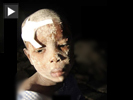
One year ago today, Haiti was devastated by a massive earthquake. Up to a quarter of a million people were killed and more than 1.5 million were made homeless. It was one of the worst natural disasters in history. We go back to January 12, 2010, and to the aftermath of the earthquake — what Haitians call Tè Tremblé, the earth trembles. [includes rush transcript]
Transcript
AMY GOODMAN: One year ago today, Haiti was devastated by a massive earthquake. Up to a quarter of a million people were killed. Over one-and-a-half million were made homeless. It was one of the worst natural disasters in history.
Today, on this first anniversary of the disaster, we spend the hour on Haiti. We begin by going back to January 12th, 2010, and to the aftermath of the earthquake, what Haitians call tè tremblé, the earth trembles.
AMY GOODMAN: Haiti, it’s been devastated by a massive 7.0-magnitude earthquake, causing a catastrophe of major proportions.
HAITIAN MAN 1: We need help. We need help, international help. There is no help, no hospital, no electricity, nothing. No food, no phone, no food, no water, nothing. There are too many people dying.
JESSE HAGOPIAN: What’s really eerie is the sound of just screaming, which is constant. I can hear it right now.
DEANE MARCHBEIN: I imagine that not since the Crimean War have surgeons seen and amputated so many limbs. Perhaps the Civil War in the United States. But we’re talking about a situation that I’ve certainly never seen in my experience.
AMY GOODMAN: Haiti is shaken to the core. It is devastated, as if a bomb, many bombs, exploded. The smell of death hangs in the air everywhere. We talked to a young man who was there digging through cement. He’s covered in dust, in cement dust. And we asked him, “What are you digging for?” And he said, “My grandfather.”
PRESIDENT RENÉ PRÉVAL: [translated] You have seen the images. You know the figures. More than 200,000 bodies were collected on the streets. Counting those still found under the rubble, the death toll could rise to 300,000. More than 250,000 destroyed or damaged homes, more than 1.5 million people are suddenly homeless.
U.N. SECRETARY-GENERAL BAN KI-MOON: It is one of the largest, most serious natural disasters in recent decades.
DR. VANDER HEYDEN: And in combination with a country which is very poor, with a very poor infrastructure, it creates a situation even worse.
PATRICK DELATOUR: The second third of the population has moved into streets, public places, public square, in any available land. And they are right now the non-sheltered people.
GERALD DESEUX: No food, no dress, no nothing. They don’t have nothing to eat. They don’t even have nothing to drink.
JEAN-MAX BELLERIVE: [translated] I can simply tell you that the people of Haiti are in need of more, more and more, to complete the sole task of reconstruction.
AMY GOODMAN: So we’ve come to the end of the hospital compound. It’s the morgue. Until the last days, the bodies were piled here four feet deep. Now they say they’ve taken all the bodies, not exactly clear where, but people are talking about mass graves.
LT.-GEN. KEN KEEN: What we’ve been doing thus far is, in a crisis reaction, obviously, to the situation, pushing out as much as we can to address the immediate needs. It takes an estimated one million rations a day in order to sustain it.
DR. EVAN LYON: This aid attention is nice. The extra supplies are nice. The energy and the money is helpful. But if the Haitian institutions are not rebuilt, nothing will be durable, and in one year we’ll be exactly where we are right now, which is in pain.
AMY GOODMAN: And one year later, the words of Dr. Evan Lyon, a professor with Partners in Health, are agonizingly true: Haiti is still in pain. If anything, the situation has gotten worse. A cholera epidemic has spread throughout the country, killing more than 3,600 people, infecting more than 170,000. More than a million people remain homeless, still living in makeshift shelters in hundreds of tent camps. Port-au-Prince is a city of earthquake refugees. There is little food, clean water or sanitation.
Reconstructions efforts have barely begun a full 12 months after the disaster. By some estimates, less than five percent of the rubble has been cleared, and only 15 percent of the temporary housing that is needed has been built. Less than 10 percent of the $9 billion pledged by foreign donors has been delivered.
Meanwhile, Haitian women and girls are facing an increasing threat of sexual violence. Amnesty International says more than 250 cases of rape in several makeshift camps were reported in the first 150 days after the earthquake.
This all comes amidst continuing political uncertainty following the disputed presidential elections last November. The vote was widely denounced as flawed, with reports of fraud and intimidation at polling stations, and protests broke out when the provisional results were announced in December. On Monday, it was reported the Organization of American States will recommend that Jude Célestin, the governing party candidate, should be dropped from the runoff vote.












Media Options